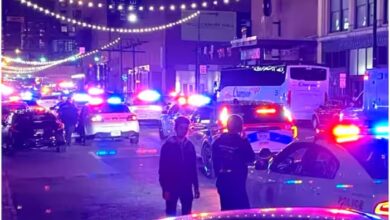The PM of Israel directs the army to be ready to evacuate citizens from Rafah in Gaza
GAZA STRIP: Following Prime Minister Benjamin Netanyahu’s command for his army to “prepare to operate” in the southern border city that has evolved into a final refuge for fleeing Palestinians, Israeli air strikes decimated the densely populated Rafah on Saturday.

Rights organizations and Washington have denounced Netanyahu’s proposed onslaught on Rafah, where an estimated 1.3 million people have taken shelter. The Palestinians, however, have said that they have nowhere else to go.
Witnesses reported more attacks on Rafah early on Saturday, after an increase in Israeli military airstrikes, which incited Palestinians to fear an impending ground assault.
Mohammad al-Jarrah, a Palestinian who was uprooted from farther north to Rafah, stated, “We don’t know where to go.”
The city serves as both the primary entrance point for much-needed humanitarian supplies and the final significant population center in the Gaza Strip that Israeli forces have not yet reached.
“Submit to the cabinet a combined plan for evacuating the population and destroying the battalions” of Hamas terrorists holed up in Rafah, Netanyahu ordered military authorities on Friday, according to his office.
The US State Department said that it opposes a ground attack in Rafah and issued a warning that such an operation runs the potential of “disaster” if improperly organized.
Israel receives military assistance worth billions of dollars from the United States, which is its primary foreign supporter.
However, expressing his mounting annoyance with Israel’s leadership, President Joe Biden delivered his most pointed critique of the war’s handling so far, characterizing the reaction for Hamas’s October 7 strike as excessive.
“I’m of the view, as you know, that the conduct of the response in Gaza, in the Gaza Strip, has been over the top,” the president of the United States said.
“There are a lot of innocent people who are starving… in trouble and dying, and it’s got to stop.”
Thousands of Palestinians are camped out in tents near the Egyptian border in Rafah, after being forced from other Gazan villages and cities.
Images from AFP depicted scenes of destruction in Rafah’s streets, where residents were waiting in line for dwindling supplies of water.
The idea of a ground invasion there has alarmed rights organizations.
Doctors Without Borders warned in a statement that “Israel’s declared ground offensive on Rafah would be catastrophic and must not proceed.” “There is no place that is safe in Gaza and no way for people to leave.”
Three youngsters lost their lives in a strike in Rafah, according to the Palestinian Red Crescent on Friday.
“We heard the sound of a huge explosion next to our house… we found two children martyred in the street,” Jaber al-Bardini, a 60-year-old
“Rafah lacks any safe places. In our houses, we will perish if they storm Rafah. We are at a loss on what to do. We have no desire to go anywhere.”
The largest city in southern Gaza, Khan Yunis, is where the Israeli army claimed to have “eliminated 15 terrorists” in the last day.
The Palestinian Red Crescent has reported “intense artillery shelling and heavy gunfire” throughout the weeks-long siege, which culminated in an Israeli attack on the city’s Al-Amal Hospital on Friday.
Eight members of the medical team, including “four doctors, as well as four wounded individuals and five patients’ companions,” were detained by Israeli soldiers at the hospital, according to the medical organization.
Any Israeli advance into Rafah, according to UN head Antonio Guterres, “would exponentially increase what is already a humanitarian nightmare”.
However, Netanyahu’s administration said that while four of the militants’ battalions remained in Rafah, it would be “impossible” to fulfill the war’s aim of eradicating Hamas.
An AFP count based on official Israeli numbers puts the dead toll from Hamas’s historic October 7 strike in Israel at roughly 1,160, most of them civilians.
The health ministry in the zone controlled by Hamas reports that Israel responded by vowing to destroy Hamas and launching airstrikes and a ground invasion that have killed at least 27,947 Palestinians, the majority of whom were women and children.
250 hostages were taken by militants; 132 of them are still in Gaza, while 29 are thought to be dead, according to Israel.
“Not something we’d support” is how State Department deputy spokesperson Vedant Patel described an Israeli ground operation in Rafah.
“To conduct such an operation right now with no planning and little thought… would be a disaster,” Patel said.
He said that during discussions this week in Jerusalem, US Secretary of State Antony Blinken had explicitly communicated Washington’s concerns to Netanyahu.
Blinken maintained that he saw “space for agreement to be reached” in the ceasefire negotiations in order to end hostilities and free Israeli detainees, despite Netanyahu’s rejection of what he called Hamas’s “bizarre demands”.
Following “positive and good discussions” on a new Gaza ceasefire and the exchange of detainees for hostages with Egyptian and Qatari mediators, according to a Hamas source, Hamas negotiators departed Cairo on Friday.
Under condition of anonymity because he was not authorized to comment on the matter, a Hamas source told AFP, “The delegation left Cairo tonight (Friday) and is awaiting Israel’s response.”
The war’s effects are being felt far and wide; since October, violence in the Middle East involving Hamas supporters supported by Iran has increased, attracting the attention of US troops among others.
Hours after firing a salvo toward northern Israel, the Iranian-backed terrorist organization Hezbollah in Lebanon stated on Friday that it had shot dozens of rockets at an army station in the Israeli-occupied Golan Heights.
The incident on Friday coincided with the arrival in Beirut of Iranian Foreign Minister Hossein Amir-Abdollahian for meetings with high-ranking officials.
Israeli missiles struck the suburbs of Damascus, the capital of Syria, early on Saturday morning, according to the official Syrian news agency and the Syrian Observatory for Human Rights, both of which claimed “material” damage.
On Friday, the US ratings agency Moody’s cut Israel’s credit rating and changed its outlook for Israel’s debt to “negative” owing to “the risk of an escalation” with Hezbollah, citing the continuing conflict and potential for broader repercussions.







